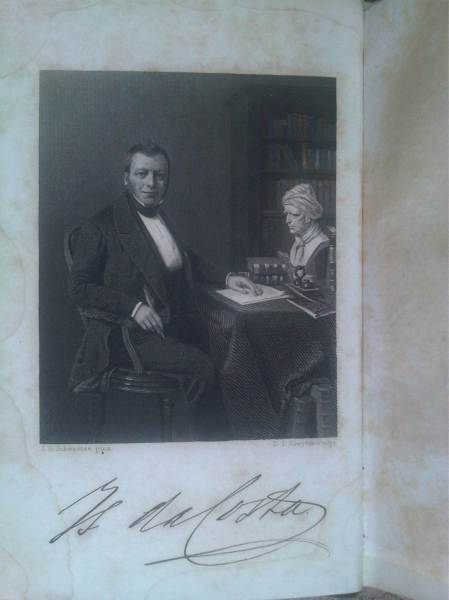There are several accounts in the English language about the person Isaac Da Costa. I’ll give some resources I found.
This first one is most satisfied and covers all the others mostly:
Isaac Da Costa – Encyclopedia Reformata
Isaac da Costa — Britannica Online Encyclopedia
Isaac da Costa – NNDB
And last my former post on Da Costa
There’s more to find, but I also came around accounts with errors.
I’ll share with you something more from the Dutch resources I have. And I will try to frequently quote his own words although, of course, translated.
Da Costa’s acquaintance with Bilderdijk was in 1813 when Da Costa attended a society of Dutch Jews[i] in Amsterdam. Bilderdijk was one of the first members of the society and in that time (1795), when many Jews were improving their knowledge in gentile History and Arts, he sought to teach them about the false doctrines of the French Revolution and on the other side of the advance of the Torah given to the Jews.[ii] Da Costa: “Did he [Bilderdijk] succeed? So much is sure that although for one heart, for one life, for one son from the people of Israel which our great Poet had so much love for because of their Fathers but most of all because of their crucified גואל (deliverer), for one it caused an eternal blessing.”[iii] As Da Costa said about himself in his biography of Bilderdijk, De Mensch en Dichter Willem Bilderdijk. The following is also extracted from this book.
As a 15 years old boy he gave his Hebrew teacher (Moses Lemans) a poet hewrote, and so it came before the eyes of Willem Bilderdijk. And by an arrangement of the teacher he met Bilderdijk. At that time Da Costa had many questions himself. Had the God of Israel been really revealed? To his fathers? Were there indeed Godly man who did miracles and signs and received Godly words? Did the Tenach really exists because of Divine inspiration? In these circumstances he met Bilderdijk.
Da Costa was a very brilliant student and he very frequently visited Bilderdijk. Bilderdijk became his personal teacher and a great friendship was developing.
In the year 1817 Bilderdijk for the first time recited his tremendous but not finished poet (De Ondergang der Eerste Wareld) from a manuscript to Da Costa. Just one sentence remained in the heart of the young Da Costa: Neen, Régol, neen, dit zijn geen aardsche zangen! (No, Regol, no, this aren’t earthly songs!) Da Costa’s own account on this: “But more than poetry, even the highest, the most above dust and earth reached sort and tone of poetry, was the element that from the beginning all dialogs gave life and teachings a higher purpose, it was that life’s-element of knowledge of God, it was the Divine truth.”[iv]
Bilderdijk didn’t advocate Christianity to his Jewish friend but according to Da Costa: “He devoted himself only to show his honor to the Law of Moses for me and where it fits he also would awake other ones for it. He rightly understood Israel and showed it to the foreground with an expectation of a glorious Messiah, but not omitting the suffering aspect. Many things worked forwards to the following opinion in my heart: For a suffering people a suffering Messiah!”
But at that time his soul didn’t have the personal need, and the “power and meaning of the passion wasn’t revealed yet. It was long before it came into my mind that Jesus from Nazarene could be the Messiah. Until an unforgettable day in October 1820, the veil before my eyes was gone and I faithfully might fallen down before this Jesus from Nazarene, King of the Jews, as also my Lord and my God!”[v]
To be continued.
[i] Israelitisch Genootschap Tot Nut en Beschaving
[ii] De Mensch en Dichter Willem Bilderdijk, Mr. Isaac Da Costa, 1859, p.275
[iii] Ibid, p.276
[iv] Ibid, p.281
[v] Ibid, p.283
